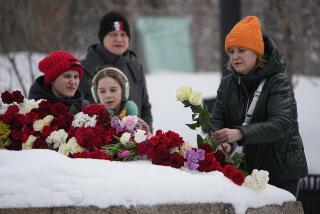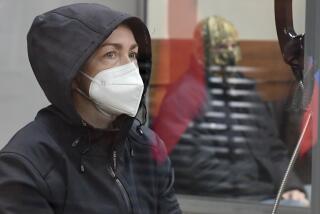Missing Radio Liberty Reporter Is Safe in Dagestan, Wife Reports
- Share via
MOSCOW — Andrei Babitsky, a correspondent for U.S.-funded Radio Liberty who was feared dead after disappearing in Russian-controlled territory in Chechnya, turned up alive and well in southern Russia, his wife said Friday.
Babitsky, a Russian citizen who angered authorities with his coverage of the Chechen war, had been missing since mid-January.
In a live television phone interview with the Russian network NTV, Babitsky’s wife, Lyudmila, was near tears as she told how her husband had unexpectedly called and assured her that he was safe and in good health.
Babitsky, 35, told his wife that he was calling from the Interior Ministry’s press center in Makhachkala, the capital of the republic of Dagestan, which neighbors Chechnya.
“The conversation was very short. I asked him about his health, and he said everything was OK and that he hoped to be home soon,” Lyudmila Babitsky said on NTV.
After Babitsky disappeared, Russian authorities at first denied they were holding him. Then Vladimir Ustinov, Russia’s acting chief prosecutor, announced Jan. 31 that Babitsky had been arrested.
The Kremlin’s spokesman on the war, Sergei V. Yastrzhembsky, said then that Babitsky was under investigation for cooperating with rebel fighters. But on Feb. 3, Yastrzhembsky announced that Babitsky had been traded to Chechen fighters in exchange for three Russian prisoners of war, claiming that Babitsky consented to the swap.
The exchange stunned Russia’s human rights movement and the Russian media and was strongly condemned in the West.
Babitsky revealed few details of his ordeal in the conversation with his wife, she said. The only information he conveyed was that he was fine and had been in Chechen territory the whole time.
But his wife, speaking in Prague, the Czech capital, said he sounded normal, in contrast to how he appeared in a television video that surfaced Feb. 9 in which he seemed strained and emotional as he spoke to the camera. She was in Prague to meet Radio Liberty officials.
“It was a kind of emotional conversation. I was crying and asking him if he was all right,” she told the Reuters news agency. “He said: ‘I’m feeling all right. Don’t worry. Maybe I will be in Moscow tomorrow.’ ”
She said she planned to go to Makhachkala if Babitsky didn’t return to Moscow by today.
An earlier video showing Babitsky being traded to men wearing balaclavas and fatigues was released by the Russian authorities Feb. 4, the day after they announced the swap.
But the video, which showed Babitsky being seized by unidentified men, posed more questions than it answered, triggering alarm among Babitsky’s relatives, friends and supporters. Many feared that the videotape and purported exchange was a cover to hide the fact that he had been killed.
Russian authorities have repeatedly insisted that Babitsky was alive, but they couldn’t say where he was, with contradictory accounts from different agencies.
The news that Babitsky is alive comes amid a new wave of deep international concern about televised footage showing more than a dozen men, apparently Chechen fighters, being buried in a mass grave.
The footage, shot by a cameraman for German television station N-24 and also aired by the BBC and several Russian networks, shows that at least two of the men had their ears cut off. The men’s feet appear to be bound with barbed wire, and one corpse is shown being dragged behind a military vehicle.
The people burying the corpses and driving the truck are not shown. But amid mounting evidence of Russian atrocities against Chechen civilians, the footage has caused international alarm, triggering a barrage of Western pressure on Russia for a full investigation.
The case has been referred to the Russian military prosecutor, but several officials, including spokesman Yastrzhembsky, have dismissed the footage as faked.
The controversy comes at an awkward time for Russia: The human rights commissioner for the Council of Europe is in Moscow to convey European concern about Russia’s war in Chechnya, which has killed many civilians. Russia has agreed to take the commissioner, Alvaro Gil-Robles, on a tour of sites in the Russian-controlled sector of Chechnya, although such visits are usually tightly controlled by the Russian military.
The New York-based organization Human Rights Watch has documented cases of at least 123 civilians executed by Russian soldiers in Chechnya.
President Clinton on Friday called for Russia to grant international organizations full access so they can freely investigate the allegations.
More to Read
Sign up for Essential California
The most important California stories and recommendations in your inbox every morning.
You may occasionally receive promotional content from the Los Angeles Times.













